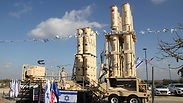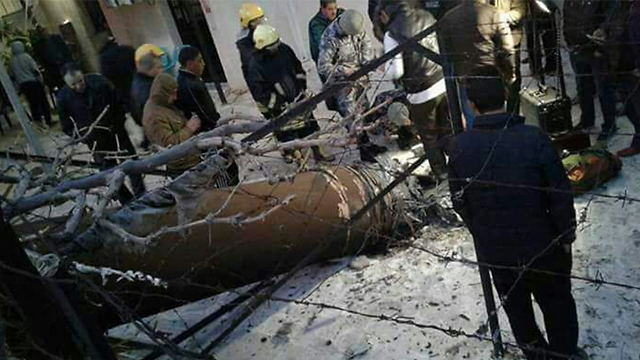
The winds of war are blowing on Israel’s borders
Analysis: The Israeli strike in Syria, the Russian and Syrian responses, and the flare-up in Gaza, are bringing Israel one step closer to a military collision. The relative calm along the borders in recent years, which has become a symbol of security stability and deterrence, is gradually wearing out.
So far, the logic behind IDF operations along the borders was that Israel must do everything in its power to avoid a military conflict. This led to the creation of an equation: On the one hand, Israel acted over the weekend to curb the transfer of long-range and accurate weapons from Syria to Hezbollah and to damage Hamas's infrastructure and capabilities in the Gaza Strip; on the other hand, Israel made sure not to push the enemy into a corner that would force it to respond in a way that could lead to an all-out conflict.
In recent weeks, however, Israel itself has been putting this equation to the test. It seems as if there is someone on our side who won’t be too sorry to see the security issue reclaim the headlines.
The weekend events in the north indicate that Israel is striking in Syria not only to curb the Iranian arms convoys to Hezbollah, but also to demonstrate its presence in Syria and make it clear, especially to the Russians, that there will be no agreement in Syria without Israel's input.
According to the Syrian army’s announcement, the Israel Air Force attacked the T4 airport, between Homs and Palmyra, a particularly sensitive area as far as the Russians are concerned, as the Syrian military recently completed a successful attack in the area with massive Russian aid. The airstrike and the interception of the Syrian anti-aircraft projectile raised the stakes for Israel on the Syrian poker table. We are one step closer to a military escalation on the Syrian front. Both sides have climbed up a high tree and are unwilling to budge.
Israel can’t climb down that tree because, according to its military policy, every show of weakness will harm its interests and give the Iranians a foothold in the Golan Heights and a pier at the port of Latakia. Such a pier will turn the supply of arms to Hezbollah from a drizzle into a deluge.
If the Syrians fail to climb down the tree and continue threatening Israel’s freedom of action against the weapon convoys to Hezbollah, a clash with the Syrian army—not just in the Golan Heights, but also deep within Syria—will be inevitable.
There is no wonder there is a nervous silence coming out of Moscow. Such incidents could have far-reaching ramifications on the agreement the Russians are trying to establish in Syria.
The Israeli ambassador in Moscow does not usually get summoned right before Shabbat unless there is unusual concern and anger on the Russian side. It’s quite possible that the Russians feel there is a gap between what they heard from Prime Minister Benjamin Netanyahu in his meetings with President Vladimir Putin and Israeli actions on the ground. This isn’t another operational misunderstanding discussed as part of the coordination between the two armies, the Israeli and the Russian, or between the two defense ministries. This is a diplomatic crisis.
In general, Syria's decision to launch the improved S-200 model, which the Russians recently sold them, is surprising. The S-200 is a heavy, immobile anti-aircraft missile, which can reach a range of 300 kilometers, and is not meant for intercepting fighter jets. Furthermore, Russian military experts said recently that Israel was using electronic warfare systems that completely “blind” the Syrian batteries and disrupt their communication systems.
As far as we know, the Russians did not provide the Syrians with any information on the Israeli strike, which adds to the ambiguity of the decision to launch the Syrian interceptor. It’s also unclear who gave the order in Syria. It’s possible that the decision to launch the missile was not made in the presidential office, and that the Syrian military echelon claimed responsibility for the launch in hindsight.
The working assumption in Israel is that the Syrian missile was directed at some target—but not at the Air Force fighter aircraft, as they were no longer there. The Israeli Air Force is now investigating what was actually shot down by the Arrow missile. It might have been a large fragment of the S-200 that exploded in the air after missing its original target.
The IDF had no early warning about the Syrian missile launch. For years, the teams operating the Arrow 2 interceptor have been waiting for a real-time test—and they passed it successfully. This is also an impressive achievement for the Israeli defense industry. The Arrow 2 intercepted a ballistic object at a range of more than 100 kilometers, beyond Israel’s borders. This is a clear message to the Iranians for the day they decide to fire Shahab missile at Israel.
In Gaza, there has been a significant spike in the number of rockets launched at Israel by Salafist groups. Israel is using this as an excuse to increase its aerial activity against critical military infrastructures in the strip. But this back-and-forth game of ping-pong is taking place during a dramatic change of leadership in Gaza. Yahya Sanwar, who will become the Hamas leader in Gaza in April, is a former student of Abdullah Azzam, al-Qaeda’s spiritual teacher. Granted, he is giving up the prison and underground manners for political visits to civil institutions in the strip, dressed in a suit, but he is not committed to the alleged signs of moderation conveyed by the Hamas leadership in the Gulf states.
Israeli officials estimate that Hamas’ failure to respond to the airstrikes should not be taken as a sign of political moderation, but rather as a sign the organization has simply not yet completed its preparations for another round of fighting. This doesn’t guarantee that Israeli pressure, which will humiliate the leadership in Gaza or lead to casualties, won’t drag Hamas into an armed conflict with the weapons it has accumulated so far.











